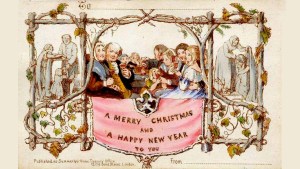There is often much controversy this time of the year around the phrase, “Merry Christmas.” Some people love the phrase, while others appear to despise it.
Whatever a person’s preference may be, the origin of the phrase is loaded with spiritual meaning.
First of all, one of the earliest records of the phrase comes from St. John Fisher, who wrote it in a letter to Thomas Cromwell in 1534.
This I beseech you to grant me of your charity. And for this our Lord God send you a merry Christmas and a comfortable to your heart’s desire.
Often today the word “merry” is used to denote a general feeling of merriment. Yet, this doesn’t appear to be the case for St. John Fisher.
Francis Xavier Weiser explains the origin of this phrase in his book Handbook of Christian Feasts and Customs.
When this greeting was originally used, the word merry did not mean “joyful, hilarious,” as it does today. In those days it meant “blessed, peaceful, pleasant,” expressing spiritual joys rather than earthly happiness.
The well-known carol “God rest you merry, gentlemen” is an excellent example of the original meaning of merry. The position of the comma clearly shows the true meaning (that the word is not an adjective describing “gentlemen”), and therefore is not “God rest you, joyful gentlemen,” but “God rest you peacefully, gentlemen.”
This revelation makes the phrase, “Merry Christmas,” even more spiritual (and possibly more controversial).
If you want to wish someone a spiritually joyful Christmas, go right ahead and say to them, “Merry Christmas!”



